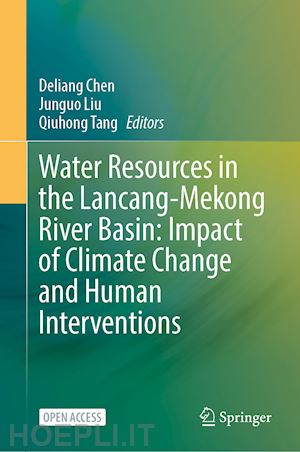
Questo prodotto usufruisce delle SPEDIZIONI GRATIS
selezionando l'opzione Corriere Veloce in fase di ordine.
Pagabile anche con Carta della cultura giovani e del merito, 18App Bonus Cultura e Carta del Docente
This open access book provides a comprehensive, up-to-date picture of the current state of knowledge covering climate change, surface water change, arsenic pollution, water utilization, water-food-energy nexus, water related hazards, water management, and water governance in the Lancang-Mekong River Basin. Considering the widely concerned fact that the climate change and human intervention induced impacts on water will bring unprecedented threats to human societies and ecosystems, the book intends to support UN’s sustainable development goals through sustainable use of water by providing the most accurate and updated information on climate and water changes in a consistent way. Underlying all aspects of the book is a strong commitment to assessing the science comprehensively, without bias and in a way that is relevant to policy but not policy prescriptive. It can provide implications to support decision-makers and stakeholders for integrated water resources management and sustainable development at all levels.
Introduction.- Climate Variability and Climate Changes: past and future.- Surface Water.- Arsenic in Hydro-Geo-Biospheres of the Mekong River Delta: Implication for Human Health.- Water resource availability and use in Mainland Southeast Asia
Prof. Deliang Chen is August Röhss Chair at the University of Gothenburg. His research includes Earth System Science, global change, and the impacts of climate change on the water cycle, ecosystem, and environment. He is Elected Member of six academies including the World Academy of Sciences, the Royal Swedish Academy of Sciences, and the Chinese Academy of Sciences. He has served on numerous international and national committees and boards. Recent examples include being Chair of the Nomination Committee of the Stockholm Water Prize; Chair of the Earth Science Division of the Royal Swedish Academy of Sciences; and Member of the International Scientific Advisory Board of the Stockholm Resilience Centre. He also acted as Coordinating Lead Author in Working Group I of the IPCC’s sixth assessment report and serves as Editor for several international scientific journals. Recently, he was awarded the H. M. The King's Medal for his outstanding contributions to climate research.
Prof. Junguo Liu is President of the North China University of Water Resources and Electric Power, and Chair Professor in the School of Environmental Science and Engineering at the Southern University of Science and Technology (SUSTech) in China. His main research interests include hydrology and water resources, global environmental change, and ecological restoration. He has earned an excellent international reputation through his contributions to the fields of water resources research, ecological restoration, and environmental sustainability. He obtained his Ph.D. degree in Environmental Sciences at the Swiss Federal Institute of Technology (ETH Zurich), Zurich, Switzerland. He is recognized with numerous awards that include the International Hydrology Prize, the World Academy of Sciences (TWAS) Award, the Paul A. Witherspoon Lecture of the American Geophysical Union, the Outstanding Young Scientist Award of the European Geosciences Union, the Communication Award of the International Society for Ecological Restoration, and the Science and Technology Award for Chinese Youth.
Prof. Qiuhong Tang is Professor in the Institute of Geographic Sciences and Natural Resources Research, Chinese Academy of Sciences. He serves as Associate Editor of Journal of Hydrometeorology, WIREs Water, and Journal of Geographical Sciences. He is Leading Editor of Terrestrial Water Cycle and Climate Change: Natural and Human-Induced Changes published by American Geophysical Union in 2016, Atlas of Environmental Risks Facing China Under Climate Change published by Springer in 2017, and Climate Risk and Sustainable Water Management published by Cambridge University Press in 2022.











Il sito utilizza cookie ed altri strumenti di tracciamento che raccolgono informazioni dal dispositivo dell’utente. Oltre ai cookie tecnici ed analitici aggregati, strettamente necessari per il funzionamento di questo sito web, previo consenso dell’utente possono essere installati cookie di profilazione e marketing e cookie dei social media. Cliccando su “Accetto tutti i cookie” saranno attivate tutte le categorie di cookie. Per accettare solo deterninate categorie di cookie, cliccare invece su “Impostazioni cookie”. Chiudendo il banner o continuando a navigare saranno installati solo cookie tecnici. Per maggiori dettagli, consultare la Cookie Policy.